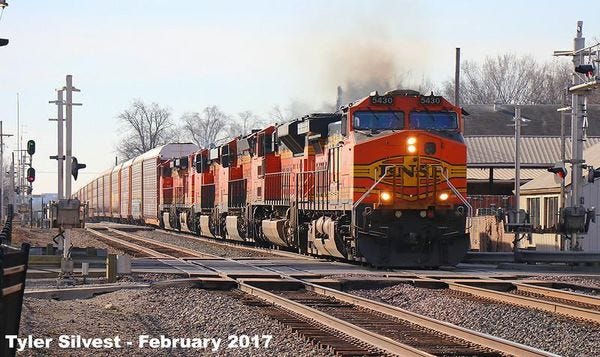US Headed Toward Railroad Strike Like ... Something That's Going Fast And Hard To Stop
Like an out of control simile!
If you want to worry about something involving transportation that's a real concern, you might consider avoiding the dumb tweets about Joe Biden flying to Delaware to vote and instead pay some attention to the possibility of a nationwide strike by America's 150,000 unionized railroad workers, who have been enduring awful working conditions and want a contract that treats them just a little more like human beings instead of automatons. The deadline for two major unions to agree on a contract is coming up Friday, and if a strike occurs, it could throw supply chains into chaos and do real damage to an economy that's been chugging along pretty well coming out of the pandemic.
PREVIOUSLY: Oh No Joe Biden VOTED
Under federal law, the government has some say over whether railroad unions can go on strike. In July, the Biden administration ordered a 60-day "cooling off" period to prevent a strike and give workers and management another chance to reach an agreement. That hold on labor action ends Friday, meaning that unions might strike, or railroads might lock out workers. During the pandemic, railroad companies made big profits even as the workforce diminished; the Guardian notes that "US railroads have paid out $196bn in stock buybacks and dividends to shareholders since 2010," and even in the post-pandemic supply-chain snarls, liberal corporate watchdog Accountable.US found, railroads managed to collect "a record $1.18 billion in fees for freight stuck in supply chain bottlenecks in the first nine months of 2021."
Earlier this year, the administration also convened a "Presidential Emergency Board" (PEB) that came up with recommendations for a possible contract in August. Unfortunately, that board didn't really address one of the chief complaints of train crews: the industry's on-call policy, which leaves crews with no real system of paid time off outside holidays and scheduled vacation days — workers caneven be penalized for taking time off for emergencies , as the Washington Post reports:
Labor groups say workers have been fired for going to routine doctor’s appointments or family members’ funerals. Conductors and engineers can be on call for 14 consecutive days, for up to 12 hours daily. They also don’t get sick days.
And while the unions have softened their demands in recent weeks — for example, they are now asking for unpaid sick days, instead of demanding paid sick days — the railways have not offered any counterproposals on these demands.
The Guardian notes that 10 of the 12 unions representing railroad workers have reached tentative agreements with railroads on new contracts, based mostly on the PEB recommendations. But the two unions representing locomotive engineers and conductors — the two-person crews in the cabs who make the trains go — are planning to walk out Friday if their concerns about scheduling and attendance aren't resolved. Those unions represent about half of unionized rail workers. While the PEB recommended higher wages, it didn't offer any significant changes in scheduling policy, which is what has workers angry in the first place.
One engineer, speaking anonymously, said
Fatigue is a chronic issue with almost everyone I know and work with. We manage it so it doesn’t get too severe. [...] We’ve been struggling through the pandemic with fatigue, exhaustion, and we have no chance to even catch our breath.
That's not just a work-life balance thing, that could almost certainly become a safety thing. Trains should not be operated by zombies, we are pretty sure.
Congress does have a couple of options as well, the Guardian points out. It could either impose a contract on the parties, or it could vote to extend the cooling-off period to give the sides more time to negotiate. If Congress votes to impose a contract workers find unacceptable, however, they may simply quit altogether. Michael Paul Lindsey, a Union Pacific engineer in Idaho, said that if it came to it, "They can try to force us out of a strike, but they can’t force us to not quit, and that could result in an even bigger effect on the economy."
CNN reports that Democrats in Congress don't seem eager to force a contract anyway; Sen. Dick Durbin (D-Illinois), the Majority Whip, said, “I don’t think it’s likely we will intervene." If a strike is to be avoided, that "depends on the parties in negotiations stepping up to the plate.”
Leaders of the two unions are meeting today with Labor Secretary Marty Walsh; Transportation Secretary Mayor Pete Buttigieg has also been involved in talks. So maybe five minutes after we post this story, there'll be terrific news about the strike being averted. Or maybe not. Some 40 percent of long-distance shipping travels by rail, and a strike could cost the economy about $2 billion a day if it happens.
[ WaPo / Guardian / CNN / Guardian / Photo by Tyler Silvest, Creative Commons License 2.0 ]
Yr Wonkette is funded entirely by reader donations. If you can, please give $5 or $10 a month to help keep us on track!
Do your Amazon shopping through this link, because reasons .




That's what the Fed has been trying to do, trigger a recession to raise unemployment and lower wages, they're quite open that this is the reason for interest rate hikes.
I'd take a similar but somehow still opposite approach: Outlaw stock re-selling. You can only sell stocks back to the company and to no-one else.